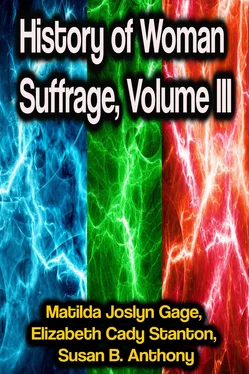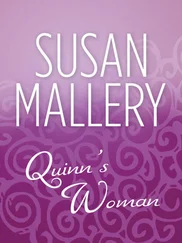The American Suffrage Association has always recommended petitions to congress for a sixteenth amendment. But it recognizes the far greater importance of petitioning the State legislatures. First —Because suffrage is a subject referred by the constitution to the voters of each State. Second —Because we cannot expect a congress composed solely of representatives of States which deny suffrage to women, to submit an amendment which their own States have not yet approved. Just so it would have been impossible to secure the submission of negro suffrage by a congress composed solely of representatives from States which restricted suffrage to white men. While therefore we advise our friends to circulate both petitions together for signature, we urge them to give special prominence to those which apply to their own State legislatures, and to see that these are presented and urged by competent speakers next winter.
By request of a large number of the senators,[33] the Committee on Privileges and Elections granted a special hearing to Mrs. Hooker on Washington's birthday—February 22, 1878. It being understood that the wives of the senators were bringing all the forces of fashionable society to bear in aid of Mrs. Dahlgren's protest against the pending sixteenth amendment, the officers of the National Association issued cards of invitation asking their presence at this hearing. We copy from the Washington Post:
The conflicting rumors as to who would be admitted to hear Mrs. Hooker's argument before the Senate Committee on Privileges and Elections, led to the assembling of large numbers of women in various places about the capitol yesterday morning. At 11 o'clock the doors were opened and the committee-room at once filled.[34] Mrs. Hooker, with the fervor and eloquence of her family, reviewed all the popular arguments against woman suffrage. She said she once believed that twenty years was little time enough for a foreigner to live in this country before he could cast a ballot. She understands the spirit of our institutions better now. If disfranchisement meant annihilation, there might be safety in disfranchising the poor, the ignorant, the vicious. But it does not. It means danger to everything we hold dear.
The corner-stone of this republic is God's own doctrine of liberty and responsibility. Liberty is the steam, responsibility the brakes, and election-day, the safety-valve. The foreigner comes to this country expecting to find it a paradise. He finds, indeed, a ladder reaching to the skies, but resting upon the earth, and he is at the bottom round. But on one day in the year he is as good as the richest man in the land. He can make the banker stand in the line behind him until he votes, and if he has wrongs he learns how to right them. If he has mistaken ideas of liberty, he is instructed what freedom means.
Wire-pulling politicians may well fear to have women enfranchised. There are too many of them, and they have had too much experience in looking after the details of their households to be easily duped by the tricks of politicians. You can't keep women away from primary meetings as you do intelligent men. Women know that every corner in the house must be inspected if the house is to be clean. Fathers and brothers want women to vote so that they can have a decent place for a primary meeting, a decent place to vote in and a decent man to vote for.
The Indian question would have been peacefully and righteously settled long ago without any standing army, if Lucretia Mott could have led in the councils of the nation, and the millions spent in fighting the Indians might have been used in kindergartens for the poor, to some lasting benefit. Down with the army, down with appropriation bills to repair the consequences of wrong-doing, when women vote. Millions more of women would ask for this if it were not for the cruelty and abuse men have heaped upon the advocates of woman suffrage. Men have made it a terrible martyrdom for women even to ask for their rights, and then say to us, "convert the women." No, no, men have put up the bars. They must take them down. Mrs. Hooker reviewed the Chinese question, the labor question, the subjects of compulsory education, reformation, police regulations, the social evil, and many other topics upon which men vainly attempt to legislate without the loving wisdom of mothers, sisters and daughters. The senators most interested in the argument were observed to be those previously most unfriendly to woman suffrage.
It was during this winter that Marilla M. Ricker of New Hampshire, then studying criminal law in Washington and already having quite an extensive practice, applied to the commissioners of the District of Columbia for an appointment as notary public. The question of the eligibility of woman to the office was referred to the district-attorney, Hon. Albert G. Riddle, formerly a member of congress from Ohio, and at that time one of the most prominent criminal and civil lawyers before the bar. Mr. Riddle's reply was an able and exhaustive argument, clearly showing there was no law to prevent women from holding the office. But notwithstanding this opinion from their own attorney, the commissioners rejected Mrs. Ricker's application.[35]
Bills to prohibit the Supreme Court from denying the admission of lawyers on the ground of sex had been introduced at each session of congress during the past four years. The House bill No. 1,077, entitled "A bill to relieve certain disabilities of women," was this year championed by Hon. John M. Glover of Missouri, and passed by a vote of 169 ayes to 87 nays. In the Senate, Hon. George F. Edmunds of Vermont, chairman of the Judiciary Committee reported adversely. While the question was pending, Mrs. Lockwood addressed a brief to the Senate, ably refuting the assertion of the Court that it was contrary to English precedent:
To the Honorable, the Senate of the United States:
The provisions of this bill are so stringent, that to the ordinary mind it would seem that the conditions are hard enough for the applicant to have well earned the honor of the preferment, without making sex a disability. The fourteenth amendment to the constitution declares that:
All persons born or naturalized in the United States and subject to the jurisdiction thereof, are citizens of the United States and of the State wherein they reside. No State shall make or enforce any law which shall abridge the privileges or immunities of citizens of the United States. Nor shall any State deprive any person of life, liberty or property without due process of law, nor deny to any person within its jurisdiction the equal protection of the laws.
To deny the right asked in this bill would be to deny to women citizens the rights guaranteed in the Declaration of Independence to be self-evident and inalienable, "life, liberty and the pursuit of happiness"; a denial of one of the fundamental rights of a portion of the citizens of the commonwealth to acquire property in the most honorable profession of the law, thereby perpetuating an invidious distinction between male and female citizens equally amenable to the law, and having an equal interest in all of the institutions created and perpetuated by this government. The articles of confederation declare that:
The free inhabitants of each of these States—paupers and fugitives from justice excepted—shall be entitled to all privileges and immunities of free citizens in the several States.
Article 4 of the constitution says:
Full faith and credit shall be given in each State to the public acts, records, and judicial proceedings of every other State.
Illinois, Michigan, Minnesota, Missouri, North Carolina, Wyoming, Utah, and the District of Columbia admit women to the bar. What then? Shall the second coördinate branch of the government, the judiciary, refuse to grant what it will not permit the States to deny, the privileges and immunities of citizens, and say to women-attorneys when they have followed their cases through the State courts to that tribunal beyond which there is no appeal, "You cannot come in here we are too holy," or in the words of the learned chancellor declare that:
Читать дальше












